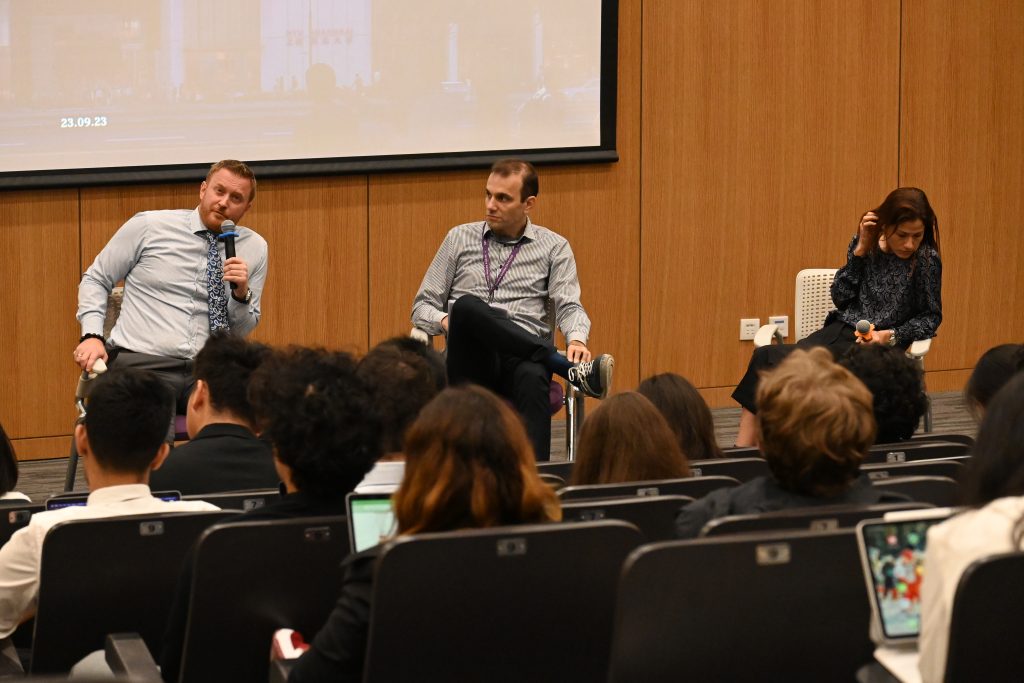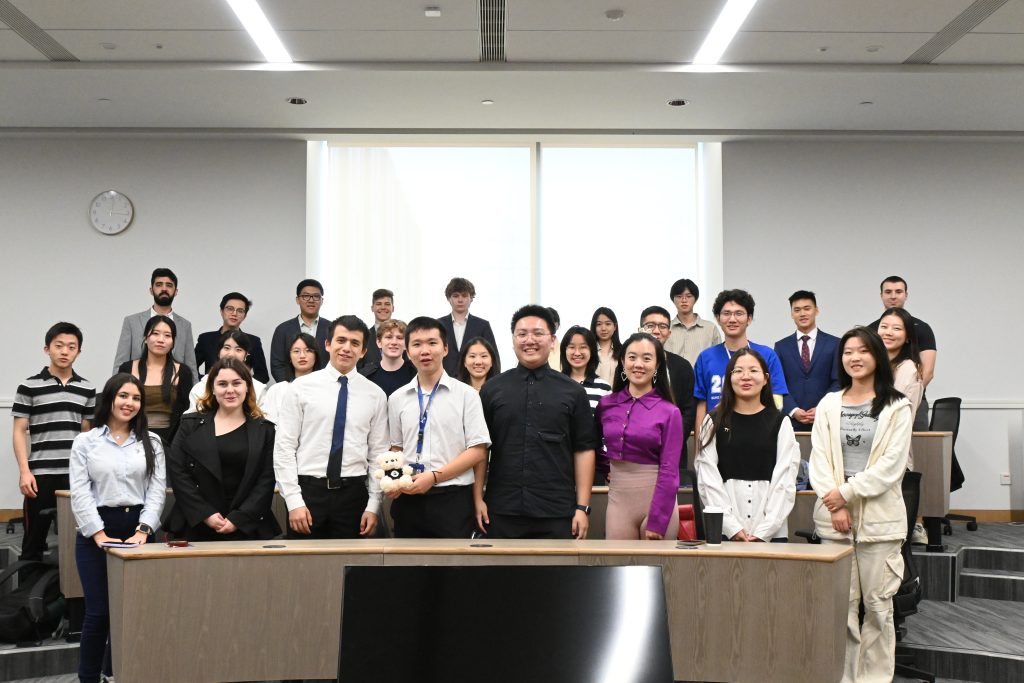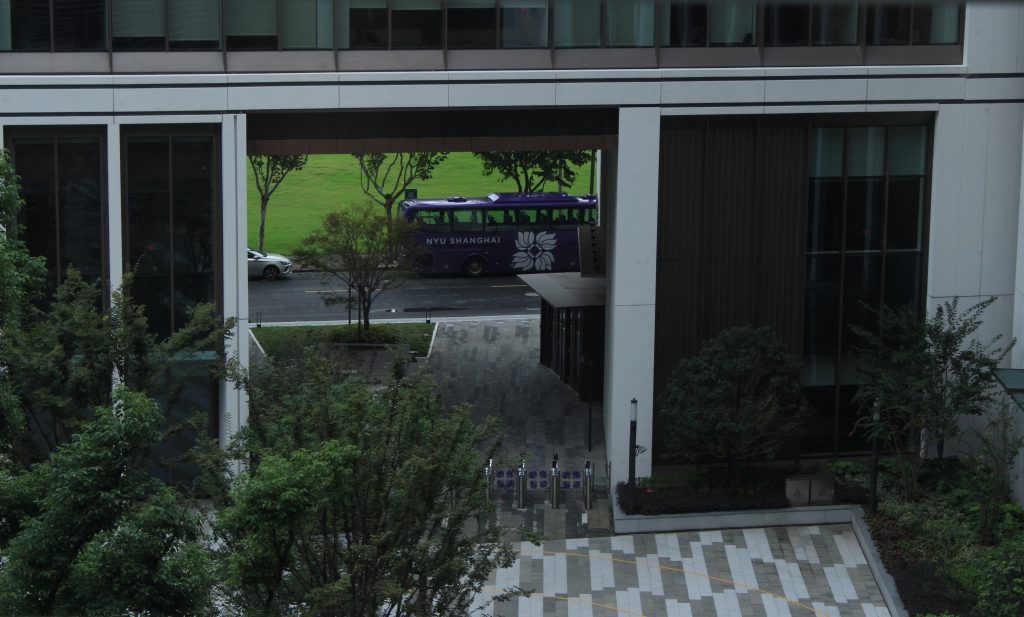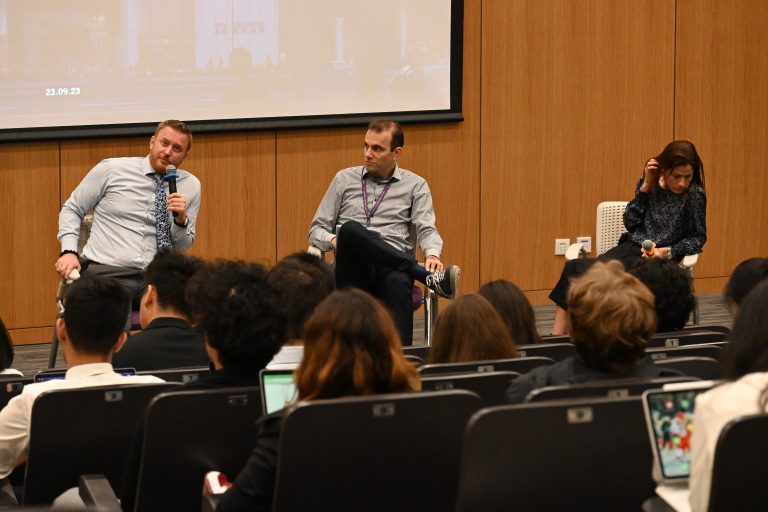
The following article is part one of a five-part series…
Pudong New District, Shanghai
DKU’s Finance Club travelled to Shanghai for a day of learning from industry experts on economics, finance and doing business in China last month. Titled the “Chamber of Commerce” weekend, the event was held at NYU Shanghai’s new Qiantan campus in Pudong New District by NYU Shanghai’s Economics Society, the NYU Shanghai Economics Department and the Tamid Group at NYU Shanghai.

An all-day program, the event featured five panels including: supply chains and manufacturing, finance, technology, trade and infrastructure and real estate. With a special centering on China’s financial capital of Shanghai, the Sep. 23 event gave students the latest information and analysis on each respective topic from experts who had weathered the Covid-19 pandemic.
The speakers at the event included NYUSH professors, business professionals and representatives from multiple chamber of commerce organizations located in Shanghai including the American Chamber of Commerce and the Israeli Chamber of Commerce. A question and answer session followed each panel conversation in addition to a chance to meet and chat with panel experts.
Each panel was held in a large lecture hall while breaks between the sessions allowed students to continue conversations with the experts or explore the NYUSH Qiantan campus.

Panel 1/5 – Supply Chains and Manufacturing
Three speakers kicked off the conference with the supply chains and manufacturing panel. Moderated by Emiliano Catonini, an Associate Professor of Economics at NYUSH, the panel featured two speakers including Dr. Martin Lockstrom, the Executive Director of the International Institution of Cooperation Management and Iris Kastoriano, the General Manager of the Israeli Chamber of Commerce in China.
A topic dominating news headlines during and after the Covid-19 pandemic, Catonini’s first question targeted the state of supply chains in China following pandemic disruptions and other influencing forces including a global push towards sustainability, the Belt and Road Initiative, and growth of digital markets in China.
Kastoriano painted a picture of mixed feelings concerning supply chains and manufacturing in China. Referencing a push by foreign firms to move operations out of China that took place prior to the pandemic, Kastoriano explained that such a task is extremely challenging if not unfeasible for certain companies.
As business in China became more expensive (mentioning specifically employment and logistics costs) and geopolitical concerns increased, Kastoriano stated China was becoming less attractive for manufacturing prior to the pandemic.
Countering concerns over China’s loss in attractiveness due rising costs, Kastoriano highlighted China’s ability to maintain manufacturing and logistics during the pandemic, giving the nation an aura of stability that was absent in other countries.
Despite talks of decoupling or as it is often termed, “de-risking,” the speaker stated international companies are reevaluating strategy as the price of the Yuan and logistics prices drop within China and the market possibly becomes more attractive.
Kastoriano explained that companies are more cost sensitive today. Despite geopolitical concerns including the war in Ukraine, the speaker stated that companies “need to be sensitive to the prices” with worldwide demand low but logistics prices in China also decreasing, keeping them, especially industrial manufacturers, to maintain their operations in China.
Lockdown in Shanghai: From the Supply Chain Perspective
“…I think from the supply chain point of view it was the most insightful period of my career. I never got such an intuitive understanding for supply chains as during the lockdown period.”
Dr. MArtin Lockstrom
Lockstrom, a resident of Shanghai during the infamous Covid-era lockdown, provided an insightful first-hand account of life during intense quarantine and supply chain operation during a crisis.
Labeling his situation as a “struggle for survival,” Lockstrom described the situation as a shock for those from first world countries in terms of the fight to find and purchase food.
“Lockdown in China, means lockdown,” the former professor stated. With “no expert dictating everything top down,” Lockstrom described the bottom-up organization that took place whereby Shanghai communities bundled expenses as residents were forced to order food and other supplies in-bulk due to grocery stores being closed.
“True eye opener and it really changes your mentality and mindset and appreciation for basic things in life.”
dr. martin lockstrom
Asserting he spent 50 percent of his waking time trading for food for he and his family, Lockstrom explained how Shanghai residents bartered with neighbors for supplies to fulfill needs.
“The challenge with supply chains, is it is a long chain”
dr. martin lockstrom
From a business point of view, Lockstrom explained how the pandemic revealed how dependent each firm was on China given the globalized nature of supply chains.
“The pandemic made everyone realize how dependent they really are on China for pretty much everything.”
dr. martin lockstrom
Recalling the pandemic-era scenes of countries scrambling to find face masks and other personal protective equipment, Lockstrom highlighted the global dependency on China for critical supplies that was made painfully obvious during the crisis.
“The challenge with supply chains, it’s a long chain with different tiers,” Lockstrom explained. “Most businesses, they don’t have transparency across the supply chain. They only have insight into their tier one suppliers and the direct customers. Their second tier, third tier suppliers, most companies don’t have a clue,” Lockstrom explained.
“I usually say that you don’t understand what you supply chain looks like until there is a crisis.”
dr. martin lockstrom
Lockstrom talked about bottlenecks that were witnessed during the crisis recalling scenes of Chinese ports being shut down due to single digit Covid outbreaks, factories shutting down and a collapse in airfreight.
The operations management expert pointed out a significant unintended consequence of global travel restrictions as well.
Drawing a connection between commercial flying and airfreight, Lockstrom explained that two thirds of all air freight at a given time is shipped in the underbelly of commercial aircraft. Therefore, when air travel was almost entirely grounded during the pandemic, two thirds of global air freight dropped to zero.

Lessons for the Future
“What will remain of the covid experience, the way supply chains are organized? In China and between China and the rest of the world?”
NYUSH Professor Catonini guided the conversation towards solutions and lessons to be learned from the pandemic experience.
With the previous pandemic “of an equal or bigger magnitude” taking place 100 years prior, Lockstrom explained that the problem of today’s world (pre-covid) was that there remain no people “alive to tell the tale” of the Spanish Flu and to teach learning points from that pandemic.
Lockstrom asserted that the world had forgotten of the possibility of a global crisis. Although the world had experienced smaller outbreaks over the past several decades, there hadn’t been a crisis of the Covid-19 pandemic’s magnitude in a whole century.
Stating an era of stability had led to complacency, the speaker noted that the “entire world was caught with its pants down.”
Formed during to the decade of political and economic stability leading up to the Covid pandemic, Lockstrom asserted that the lean supply chain models of the prior decade led to “anorexic supply chains” leaving companies vulnerable to supply shocks and crises.
“It works until it doesn’t work” Lockstrom said, referring to manufacturing operations supplied by lean supply chains. Stating that firms across the globe were focused on keeping lean supply chains and limited inventory in the decade leading up to the pandemic, Lockstrom attributed the extent of damage to the world economy to companies’ unpreparedness.
Lockstrom suggested companies should form plans to handle future crises, “institutionalize the learning points” of the pandemic and to implement buffers in their supply chains.
Calling for vigilance, the former professor suggested companies frequently self-manufacture small crises in their operations to prepare for future real crisis events. If companies fail to learn from the Covid pandemic, they will fall victim to future crises, Lockstrom asserted.
Risk, Decoupling and Future Chamber Policy
“Decoupling is getting serious. You don’t see it much in the numbers but there are signs.”
prof. Emiliano Catonini
Directed towards ISCHAM general manager Kastoriano, Professor Catonini continued with the subject of risk regarding US-China supply chain relations. Referencing the strong relationship between Israel and the US, Catonini asked about the effect of emerging political risks on the work of the Israeli Chamber of Commerce and on the Israeli nation in general.
Describing Israel’s position as an entrepreneurial nation, claiming the nation as the world’s second-best hub for entrepreneurialism besides California, Kastoriano explained the choices Israeli companies must make when working with the US or China.
“When you’re talking about a start up that is looking for an investment, for sure you will have to decide if it is going on China or going on US,” Kastoriano explained.
Describing the formation of a two-‘track’ economic system whereby companies have to choose to operate within a US or China-led track, the representative explained how Israeli companies are forced to choose one of the two paths, effectively eliminating working with both countries, a path implied to be possible in the past.
“A company has to decide if they’re going on US investment or the US track or if it is going on the China track. This is for investment, this is for [a] start up, and this is for [developing] technology,” Kastoriano asserted.
However, discussing the conversation of decoupling/ “de-risking” from a global perspective, Kastoriano asserted that for large manufacturing companies, “decoupling is not going to happen because most of the supply chain is in China,” referencing the stability and attractiveness of Chinese supply chains that she explained earlier in the panel discussion.
The ISCHAM General Manager emphasized the chamber’s status as a non-governmental organization which aims to be completely disconnected from and not concerned with political affairs.
Sustainability & Supply Chains
A conversation on sustainability and supply chains concluded the panel with Professor Catonini targeting specifically China’s global leadership in extraction and processing of Rare Earth Minerals (REMs).
Addressing Lockstrom, who’s roots are in Sweden, Catonini asked about the Swedish consciousness for environmental concerns and whether the Swedish Chamber of Commerce has been making efforts to “increase the demand for transparency,” and sustainability when it comes to supply chains in China.
Although China does not have the largest deposits of REMs in the globe, China is just the biggest exporter as it is one of the few countries willing to extract the resources from the ground, Lockstrom stated.
An intensive, dirty and environmentally taxing process, Lockstrom described a global offshoring of this process to China leading to an outsized global dependency on China for REM supply.
“Don’t put all eggs in one basket.”
dr. martin lockstrom
However, following “de-risking” trends, Lockstrom explained that companies are now looking for other REM suppliers. Highlighting global dependency on a seemingly sole REM supplier (China), Lockstrom suggested companies should diversify their supply portfolios as a risk-management strategy, similar to how one would pursue a diversified strategy within a stock investment portfolio.
Underscoring the struggle between firms looking to move part or all of their business out of China and pragmatic short-term market considerations given China’s often unmatched low-cost business and manufacturing environment, Lockstrom called out companies which pride themselves on product labels such as “globally sourced” while maintaining 90 percent of their sourcing from China.
“That’s not global sourcing, it’s China sourcing. It’s just that China pretty much can offer everything at competitive prices,” Lockstrom exclaimed. “Out of convenience everyone [has relied] on China for sourcing, even for rare earth minerals as well,” Lockstrom explained.
The operations management expert’s sentiments outline the quagmire companies have encountered with attempting or thinking about moving operations out of China in the pursuit of minimizing developing risk concerns.
In line with global risk and dependency concerns, the panelist predicted that some diversification will come to the REM industry but that it will not be significant, it will be limited, and those new sources “will take a long time to come online.”
Regarding efforts to deal with REM dependency, Lockstrom claims that a more likely path than significant REM diversification will be a complete transformation in the technologies which require REMs.
“What I think is an even more likely path is to change the technology completely,” Lockstrom asserted, referencing the opportunity for technological and scientific breakthroughs to change the demand landscape for REMs.
Referring to lithium-iron batteries, a technology which has grown consistently in demand following massive expansions in electric vehicle manufacturing in recent years, Lockstrom described the range of rare and expensive-to-source minerals required to manufacture such batteries.
Calling for the development of alternative technologies, Lockstrom raised the concern for diminishing supplies of these minerals in addition to the potential for companies to make revolutionary improvements in costs following changes in materials.
Dr. Martin Lockstrom has spent nearly two decades working and living in China. Born in Sweden, Lockstrom arrived in China in 2006 after obtaining his PhD at the European Business School in Germany. Lockstrom spent three years as a professor at Shanghai’s Tongji University conducting research training and teaching operations supply chains management. After his time at Tongji, the professor moved to the China Europe International Business School (CEIBS) (also in Shanghai) where he spent 3.5 years teaching. Taking up a job in Germany for two years, Lockstrom returned to China where he took up consulting for the next eight years. Beginning in 2020, Lockstrom taught teaching operations management at Xian Jiaotong-Liverpool University (XJLU) in Suzhou. Lockstrom now serves as the executive director of the International Institute for Cooperations Management which aims to bridge gaps between academic and industry partners.
Iris Kastoriano, General Manager of the Israeli Chamber of Commerce in China, has spent 11 years living with her family in Shanghai, promoting business ties between Israel and China. “Iris holds a DBA (Doctor of Business Administration) from the International School of Management (ISM), France; a Master’s degree in Business Management (MBA) from The Ben-Gurion University of the Negev, Israel, and a Master’s degree in law studies (MA) from Bar Ilan University, Israel. In addition, Iris holds a B.A. in Health systems management from The Ben-Gurion University of the Negev, Israel,” the ISCHAM website reads. Besides her experience in the private and public sector, Kastoriano has spent two years with ISCHAM.

